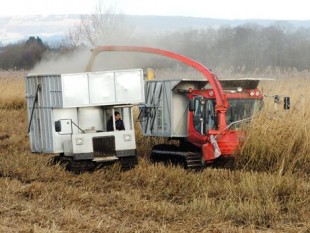
Like most projects there is never enough time. Participants are frantically trying to refine and pull together the final pieces of their projects, as they generate the data needed for their final life cycle analysis and the process cost analysis of their systems.
Over the last two months successful demonstration days have been undertaken in both Somerset and Suffolk, enjoyed by a good number and range of participants. These delivered the demonstration of the end to end systems, from harvesting through to energy production.
The specialist harvesters dealt with the difficult wetland conditions, cutting and collecting material from the reedbeds of Shapwick Heath and Minsmere Nature Reserves. The biomass was then stored in AgBags ready for combustion in the form of briquettes or loose biomass or silaged on-farm, ready to be converted through anaerobic digestion for the production of heat and electricity.
Although both AB Systems and Natural Synergies have now completed their demonstration days, the AMW-IBERS events up in Scotland are planned for the 26th and 27th March, with booking still currently open.
All the details and booking can be done through the InnovateUK website. Or contact Knowledge Transfer Network via email jenni.mcdonnell@ktn-uk.org and/or telephone: 07786 967197.
The biomass to bioenergy work supported by DECC continues to expand, as further funding from a European programme has enabled the application of the knowledge and experience gained through the wetland work, into other habitats.